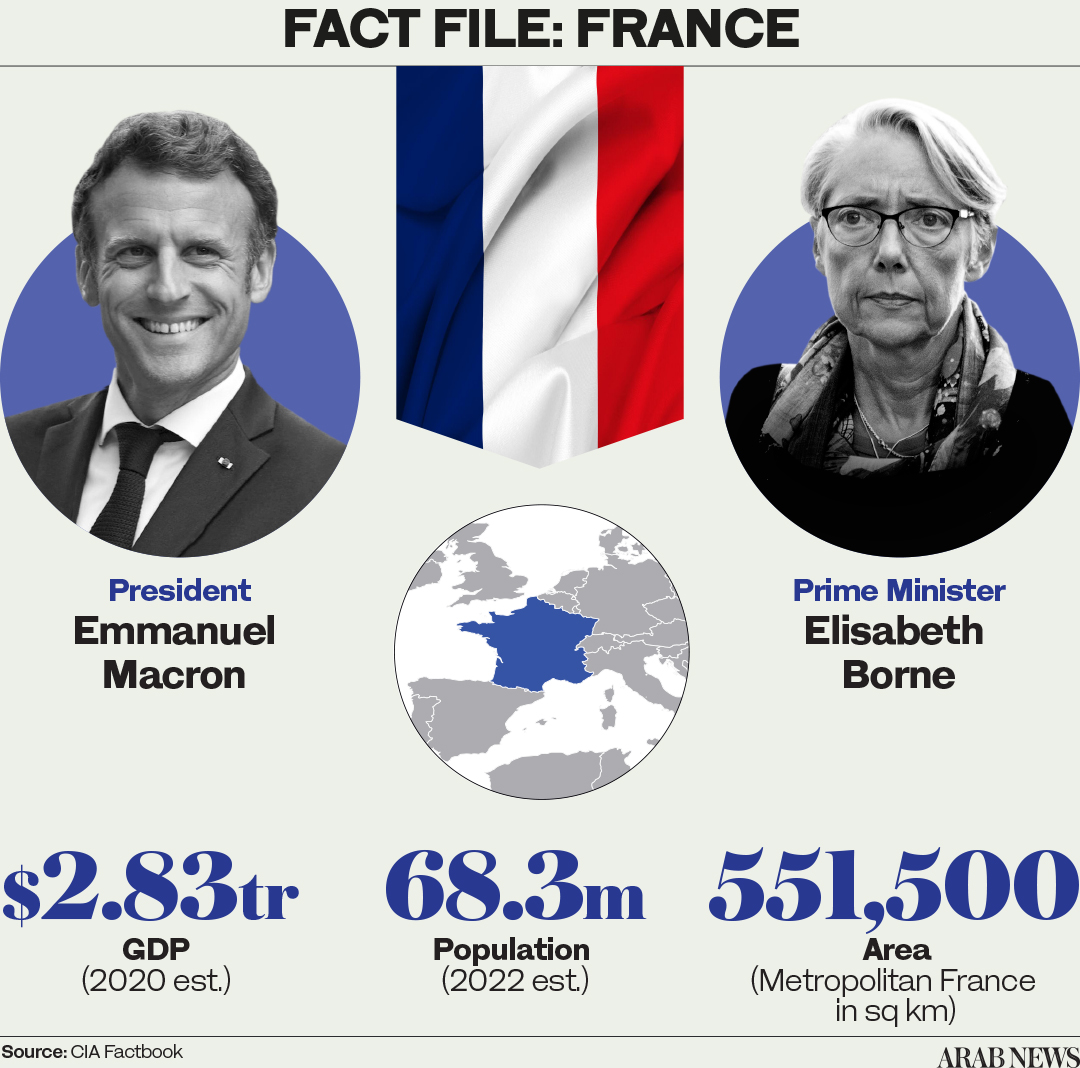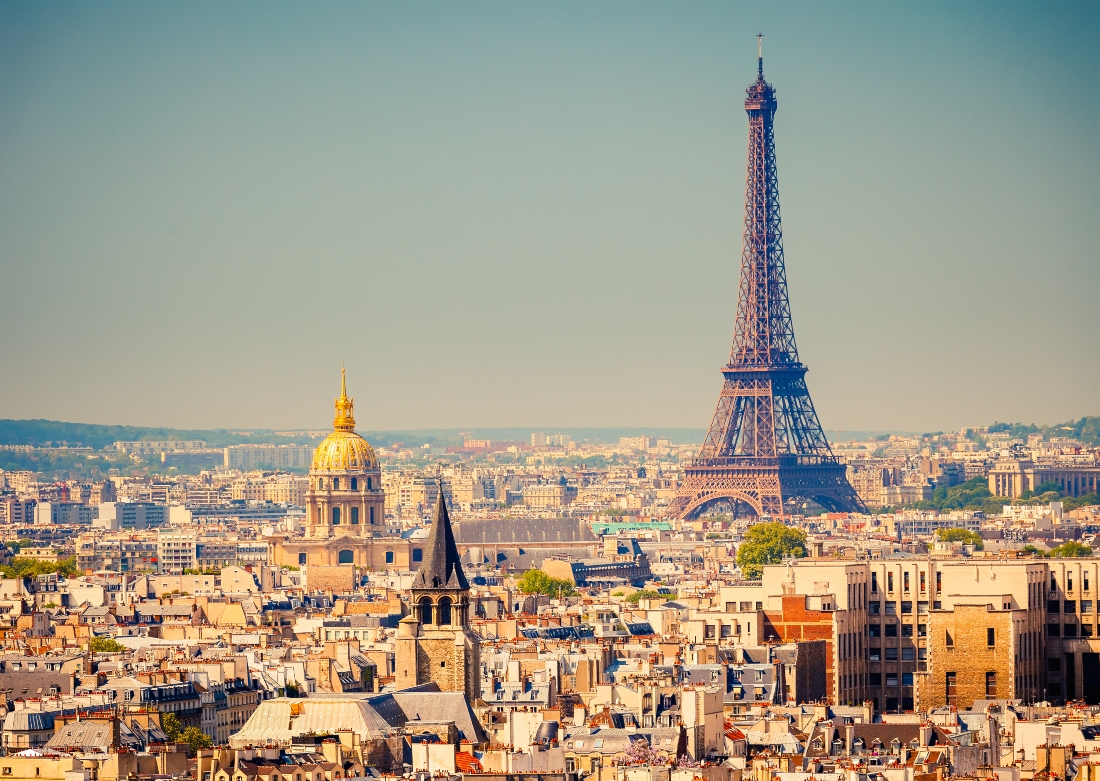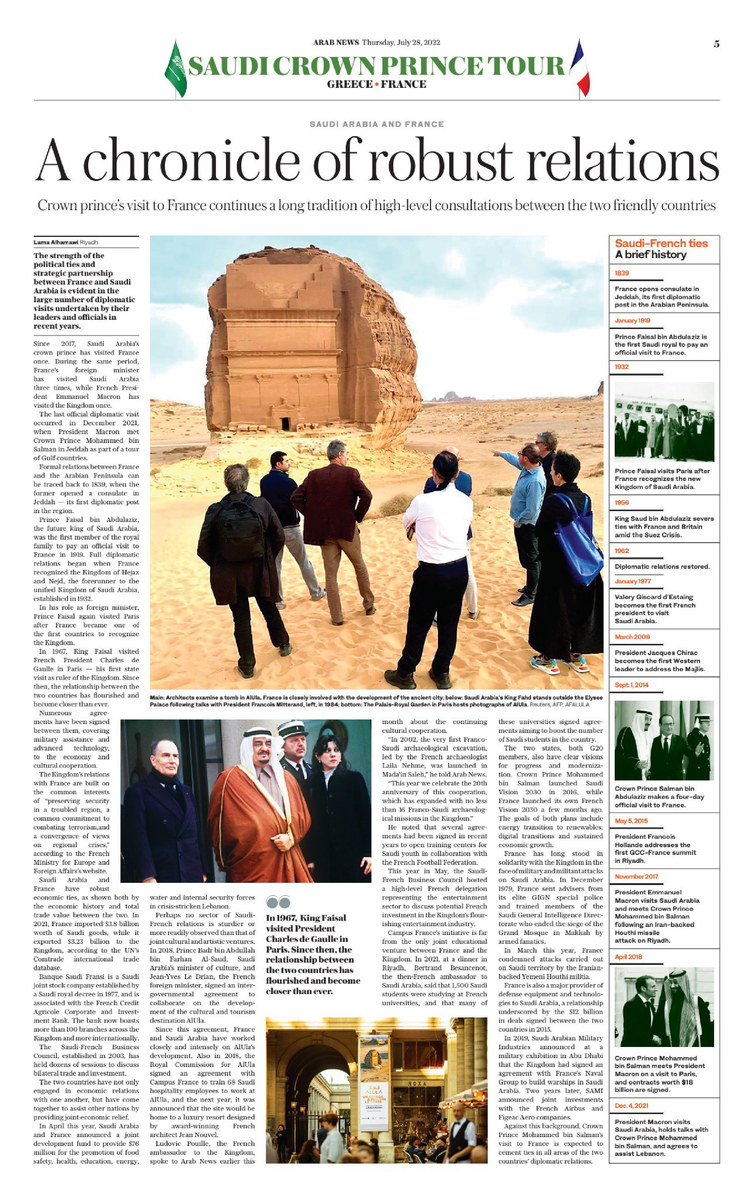RIYADH: The arrival of Saudi Arabia’s Crown Prince Mohammed bin Salman in France on a state visit continues a tradition of frequent high-level exchanges between the two friendly countries.
The strength of the political ties and strategic partnership between France and Saudi Arabia is evident in the large number of visits undertaken by their leaders and officials in recent years.
Since 2017, Saudi Arabia’s crown prince has visited France once. During the same period, France’s foreign minister has visited Saudi Arabia three times, while French President Emmanuel Macron has visited the Kingdom once.
The last official diplomatic visit occurred in December 2021, when President Macron met Crown Prince Mohammed bin Salman in Jeddah as part of a tour of Gulf countries.
Formal relations between France and the Arabian Peninsula can be traced back to 1839, when the former opened a consulate in Jeddah — its first diplomatic post in the region.
Prince Faisal bin Abdulaziz, the future king of Saudi Arabia, was the first member of the royal family to pay an official visit to France in 1919. Full diplomatic relations began when France recognized the Kingdom of Hejaz and Nejd, the forerunner to the unified Kingdom of Saudi Arabia, established in 1932.
In his role as foreign minister, Prince Faisal again visited Paris after France became one of the first countries to recognize the kingdom.
In 1967, King Faisal visited French President Charles de Gaulle in Paris — his first state visit as ruler of the Kingdom. Since then, the relationship between the two countries has flourished and become closer than ever.
Numerous agreements have been signed between them, from military assistance and advanced technology to economy and cultural cooperation.

The Kingdom’s relations with France are built on the common interests of “preserving security in a troubled region, a common commitment to combating terrorism, and a convergence of views on regional crises,” according to the French Ministry for Europe and Foreign Affairs’s website.
Saudi Arabia and France have robust business ties, as shown both by the economic history and total trade volume between the two. In 2021, France imported $3.8 billion worth of Saudi goods, while it exported $3.23 billion to the Kingdom, according to the UN’s Comtrade international trade database.
Banque Saudi Fransi is a Saudi joint stock company established by a Saudi royal decree in 1977, and is associated with the French Credit Agricole Corporate and Investment Bank. The bank now boasts more than 100 branches across the Kingdom and more internationally.
The Saudi-French Business Council, established in 2003, has held dozens of sessions to discuss bilateral trade and investment.
The two countries have not just engaged in economic relations with one another, but have come together to assist other nations by providing joint economic relief.
In April this year, Saudi Arabia and France announced a joint development fund to provide $76 million for the development of food safety, health, education, energy, water, and internal security forces in crisis-stricken Lebanon.
Perhaps no sector of Saudi-French relations is sturdier or more readily observed than that of joint cultural and artistic ventures. In 2018, Prince Badr bin Abdullah bin Farhan, Saudi Arabia’s minister of culture, and Jean-Yves Le Drian, the French foreign minister, signed an intergovernmental agreement to collaborate on the development of the cultural and tourism destination AlUla.
Since this agreement, France and Saudi Arabia have worked closely and intensely on AlUla’s development. Also in 2018, the Royal Commission for AlUla signed an agreement with Campus France to train 68 Saudi hospitality employees to work at AlUla, and the next year, it was announced that the site would be home to a luxury resort designed by award-winning French architect Jean Nouvel.
Ludovic Pouille, the current French ambassador to the Kingdom, spoke to Arab News earlier this month about the continuing cultural cooperation.
“In 2002, the very first Franco-Saudi archaeological excavation, led by the French archaeologist Laila Nehme, was launched in Mada’in Saleh,” he told Arab News.
“This year we celebrate the 20th anniversary of this cooperation, which has expanded with no less than 16 Franco-Saudi archaeological missions in the Kingdom.”
He noted that several agreements had been signed in recent years to open training centers for Saudi youth in collaboration with the French Football Federation.
This year in May, the Saudi-French Business Council hosted a high-level French delegation representing the entertainment sector to discuss potential French investment in the Kingdom’s flourishing entertainment industry.
Campus France’s initiative is far from the only joint educational venture between France and the Kingdom. In 2021, at a dinner in Riyadh, Bertrand Besancenot, the then-French ambassador to Saudi Arabia, stated that 1,500 Saudi students were studying at French universities, and that many of these universities signed agreements aiming to boost the number of Saudi students in the country.
The two states, both G20 members, also have clear visions for progress and modernization. Crown Prince Mohammed bin Salman launched Saudi Vision 2030 in 2016, while France launched its own French Vision 2030 a few months ago. The goals of both plans include energy transition to renewables, digital transitions, and sustained economic growth.
France has long stood in solidarity with the Kingdom in the face of military and militant attacks on Saudi Arabia. In December 1979, France sent advisers from its elite GIGN special police and trained members of the Saudi General Intelligence Directorate who ended the siege of the Grand Mosque in Makkah by armed fanatics.
In March this year, France condemned attacks carried out on Saudi territory by the Iranian-backed Yemeni Houthi militia.
France is also a major provider of defense equipment and technologies to Saudi Arabia, a relationship underscored by the $12 billion in deals signed between the two countries in 2015.
In 2019, Saudi Arabian Military Industries announced at a military exhibition in Abu Dhabi that the Kingdom had signed an agreement with France’s Naval Group to build warships in Saudi Arabia. Two years later, SAMI announced joint investments with the French Airbus and Figeac Aero companies.
Against this background, Crown Prince Mohammed bin Salman’s visit to France is expected to cement ties in all areas of the two countries’ diplomatic relations.
FASTFACT
History of modern France

(SHUTTERSTOCK)
The French Revolution of 1789 saw France transform from a monarchy to a republic, which came under the control of Napoleon Bonaparte 10 years later.
After he became emperor of the First French Empire from 1804-1814, his armies conquered large swaths of continental Europe. Another monarchy emerged from the wake of Napoleon’s defeat at Waterloo in 1815, and Napoleon’s nephew created the Second Empire in 1852, becoming the last monarch to rule over France.
He was ousted and the monarchy was replaced by the Third French Republic in 1870. Throughout the 19th century and early 20th century, France maintained a large colonial empire across West Africa, Southeast Asia and the Middle East.
France sided with the Allied Powers during the Second World War, but was split in two during the conflict, with most of the country controlled by a collaborationist, pro-German government.
The country slowly recovered after the end of the war, but long wars in its colonies in Indochina (now Vietnam) and Algeria saw it ousted from these regions, and by the 1960s, most of France’s former colonies had achieved independence.
France has been a full member of the UN Security Council and NATO since the end of the Second World War, and played a vital role in the establishment of the EU. France has a large Muslim and Arab population owing to its former colonies in north Africa, and many of these populations suffer from social alienation and high unemployment rates.
The country has been the site of unrest and protests against the enforcement of strict secular policies and controversial bills, some of which have attempted to ban the wearing of headscarves or traditional Muslim face coverings in public.





























